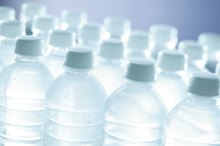Unflavored Gelatin Nutrition
Gelatin is normally made from animal collagen found in skin, bones and hooves. Vegetarian gelatin is made from seaweed, and is sold in a powdered form called agar. Gelatin is used to make products like yogurt, salad dressing and candy. Drug manufacturers use gelatin to make drug capsules, and synchronized swimmers use it to keep their hair in place during their routines. You can buy unflavored gelatin, in powdered form, at the grocery store to use in recipes.
Animal Gelatin
A one-ounce serving of unflavored gelatin has 30 calories and seven grams of protein. Gelatin is mainly composed of collagen and water, and the calories come from the collagen. Gelatin has no fat, cholesterol or sodium. It does not have carbohydrates, vitamins or minerals either.
Vegetable Gelatin/Agar
What Is Hydrolyzed Collagen?
Learn More
Half a tablespoon of agar powder has 14 calories and zero grams of protein. Unlike the animal-based gelatin, agar actually has 4 grams of carbohydrate. Agar also has 5 mg of sodium and 70 mg of potassium. Agar contains 3 percent of the daily value of calcium, 6 percent iron and 9 percent magnesium, as well as 7 percent folate.
Possible Medicinal Value
Some drug manufacturers market gelatin-based formulas for joint strength and repair. These manufacturers usually combine the gelatin with other joint remedies, like shark cartilage and chondroitin. There are also those who advocate using gelatin to treat arthritis, although there is no scientific evidence supporting this use.
Cooking Applications
Kraft Easy Mac Nutrition Information
Learn More
While gelatin does not have much nutritional value, it is valuable as a cooking ingredient. Cooks use gelatin in everything from confectionery to meat products. Gelatin acts as a whipping agent in marshmallows and souffles, a binding agent for some meat products, and a thickener in gravies and sauces. It is also used as an emulsifier in cream-based products and a clarifying agent in wine and beer.
Considerations
If you are considering adding gelatin to your diet, review the overall nutritional value of the product. While animal-based gelatin has more protein, vegetarian gelatin has more vitamins and minerals.
Related Articles
References
Writer Bio
Andy Jackson has been writing professionally since 2010. He is a certified personal trainer and yoga instructor in Cincinnati, Ohio. Jackson is also a lifestyle and weight management consultant whose work has appeared in various online publications. He holds a Bachelor of Science in kinesiology and health, and a Master of Science in sports studies from Miami University in Oxford, Ohio.









